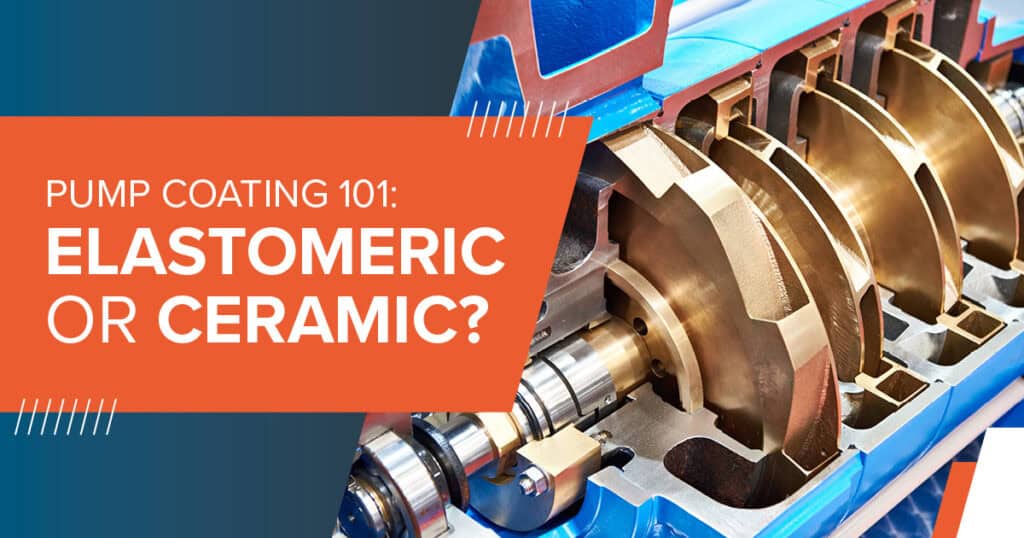Choosing the right pump coating is essential to extend the life of pumps and optimize their performance in demanding environments. Two popular options are elastomeric and ceramic coatings. Each coating has its advantages, which makes them suitable for specific applications based on unique operational challenges. If you are trying to determine which is better for your equipment, here is a guide to help you understand the key differences between elastomeric and ceramic pump coatings.
Elastomeric Coatings—Flexible and Impact-Resistant
Elastomeric coatings are made from flexible, rubber-like materials designed to withstand high levels of stress. These coatings offer excellent protection against abrasion, impact, and mechanical wear. Because of their flexible nature, elastomeric coatings can absorb energy from physical contact. This generally makes them ideal for pumps operating in environments with large particulates or solid debris that may damage other pump surfaces.
Key Benefits of Elastomeric Coatings
Flexibility—The rubber-like properties of elastomeric coatings provide superior impact resistance. Pumps coated with elastomeric materials are better equipped to handle the forces of abrasive particles and pressure changes within the system.
Abrasion Resistance—Elastomeric coatings offer effective protection in applications involving slurries or other materials that can wear down metal surfaces. Their toughness reduces wear and tear, thus extending the pump’s lifespan.
Corrosion Protection—In addition to protecting against physical wear, elastomeric coatings form a seal around the pump surface. This shields the pump from corrosion that harsh chemicals or moisture cause.
Elastomeric coatings may not offer the same level of hardness or heat resistance as other types of coatings, however. This can make them less suitable for applications with extreme temperatures or high mechanical stress.
Ceramic Coating—Hard and Chemical-Resistant
Ceramic coatings are known for their excellent durability and high resistance to chemical attacks, abrasion, and temperature extremes. These pump coatings are made from ceramic compounds to create a hard, durable surface that protects pumps in environments where chemicals or high temperatures would typically degrade other materials.
Key Benefits of Ceramic Coatings
Hardness—Ceramic coatings offer an incredibly hard protective layer, making them ideal for environments where pumps are exposed to abrasive particles, high pressures, and continuous friction. This hardness enhances the pump’s performance and longevity.
Chemical Resistance—Ceramic coatings are particularly useful in chemical processing applications where pumps may be exposed to corrosive substances. They can withstand aggressive chemicals without deteriorating, making them a better choice for corrosive environments.
Thermal Stability—Ceramic coatings can tolerate extreme temperatures, making them suitable for pumps operating under high thermal stress.
Also, ceramic coatings are brittler compared to elastomeric ones. While they offer exceptional hardness, they may crack under intense mechanical stress or impact. This might make them less effective in situations with fluctuating pressures or abrasive materials.
Which Pump Coating Is Best?
The choice between elastomeric and ceramic coatings depends largely on the pump’s operating environment. For applications where impact resistance, flexibility, and corrosion protection are essential, elastomeric coatings are often the better option. This makes them ideal for slurry pumping, mining, or applications with frequent particulate contact.
On the other hand, ceramic coatings excel in environments requiring resistance to chemical corrosion, high temperatures, and abrasive wear. Chemical processing plants, power plants, and industrial applications with harsh conditions benefit from the superior hardness and chemical resilience of ceramic coatings.
If you are looking for the best pump customizations for your operation—including coating solutions—contact DXP Pacific today. We can find the right equipment, materials, and custom configurations based on your specific processing application.

